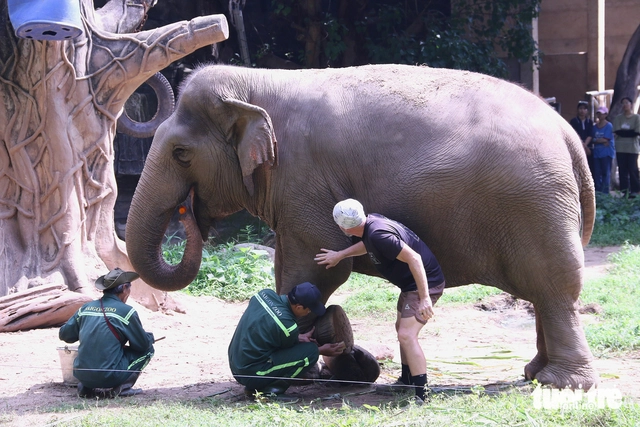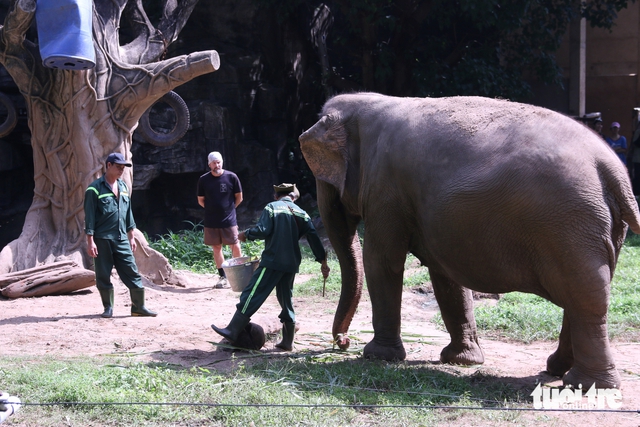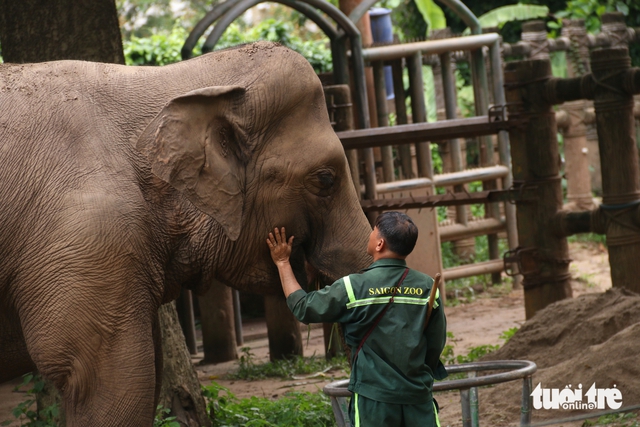
Steve Koyle (R) and zoo staff train an elephant to voluntarily lift its leg for foot care and inspection at the Saigon Zoo and Botanical Gardens in Ho Chi Minh City. Photo: Bui Nhi
The zoo has partnered with the Vietnam Zoos Association and the nonprofit group Elephant Care Unchained to introduce updated methods that prioritize animal welfare and support conservation efforts.
Steve Koyle, founder of Elephant Care Unchained, said the program uses a 'target training' technique that rewards elephants for cooperating with caretakers during daily routines.
Caretakers gently guide the elephants using a stick, and when an elephant touches the target point, it receives food as a reward.
This method, he explained, not only builds trust but also encourages natural behavior.
Instead of placing food in one fixed location, staff now scatter it throughout the enclosures to encourage the elephants to walk, forage, and reach in ways that resemble their movements in the wild.
Concrete flooring, which can harm the elephants' feet and joints over time, is also being removed from the enclosures.

An elephant is guided with a stick during a training session at the Saigon Zoo and Botanical Gardens in Ho Chi Minh City. Photo: Bui Nhi
The goal is to create an environment where the elephants can move freely, dig, take mud baths, and express other natural behaviors, reducing their dependency on humans.
The zoo is currently home to four Asian elephants: Chuong, Tom, Ny, and Bo.
Chuong, the oldest at 66 years, has formed a strong bond with her handlers, which makes medical checkups easier and may be contributing to her long life, said Mai Khac Trung Truc, director of animal care and health business at the zoo.
Ny, another elephant, has a history of circus training that initially made her resistant to the new methods.
During early training, she reacted fearfully to the guiding stick, possibly associating it with past mistreatment.

A Saigon Zoo and Botanical Gardens employee touches the cheek of an elephant. Photo: Bui Nhi
With consistent care and patience, Ny has come to understand that the stick signals a reward, not a threat.
“We avoid the use of whips and sedatives,” Truc said.
“Our approach relies on patience and positive reinforcement to encourage natural cooperation during health inspections.”
These changes are part of a broader upgrade at the Saigon Zoo and Botanical Gardens aimed at improving animal welfare through habitat renovations and enrichment activities that better reflect life in the wild.
The zoo also hopes to use these efforts as a platform for educating visitors, especially children, about animal care and the importance of conservation.



Max: 1500 characters
There are no comments yet. Be the first to comment.